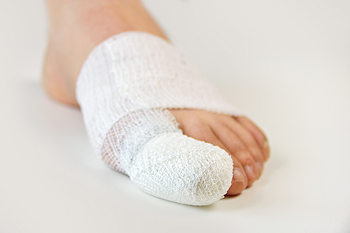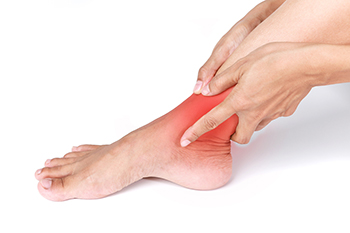Items filtered by date: April 2022
Various Causes of Heel Pain
Although plantar fasciitis (an inflammation of the plantar fascia ligament on the sole of the foot) is often the root of heel pain, it can come from a variety of other conditions as well. For instance, compression of the medial calcaneal nerve, which travels down the inner part of the ankle, can create a tingling or numb sensation in the heel as well as pain. In older adults, fat pads in the heel can wear down (fat pad atrophy) and cause pain. Systemic inflammatory conditions such as certain types of arthritis, Reiter syndrome, ankylosing spondylitis, and a common type of lupus (systemic lupus erythematosus) may sometimes be associated with heel pain. Sometimes tiny nodules, or plantar fibroma, develop on the plantar fascia which can cause pain in the arch near the heel. To have the cause of your heel pain properly diagnosed and treated, make an appointment with a podiatrist.
Many people suffer from bouts of heel pain. For more information, contact one of our podiatrists of Parkwood Podiatry. Our doctors can provide the care you need to keep you pain-free and on your feet.
Causes of Heel Pain
Heel pain is often associated with plantar fasciitis. The plantar fascia is a band of tissues that extends along the bottom of the foot. A rip or tear in this ligament can cause inflammation of the tissue.
Achilles tendonitis is another cause of heel pain. Inflammation of the Achilles tendon will cause pain from fractures and muscle tearing. Lack of flexibility is also another symptom.
Heel spurs are another cause of pain. When the tissues of the plantar fascia undergo a great deal of stress, it can lead to ligament separation from the heel bone, causing heel spurs.
Why Might Heel Pain Occur?
- Wearing ill-fitting shoes
- Wearing non-supportive shoes
- Weight change
- Excessive running
Treatments
Heel pain should be treated as soon as possible for immediate results. Keeping your feet in a stress-free environment will help. If you suffer from Achilles tendonitis or plantar fasciitis, applying ice will reduce the swelling. Stretching before an exercise like running will help the muscles. Using all these tips will help make heel pain a condition of the past.
If you have any questions please contact our offices located in Brunswick and Hinesville, GA . We offer the newest diagnostic and treatment technologies for all your foot and ankle needs.
Plantar Warts Can Be Treated!
Is My Toe Sprained or Broken?
 The symptoms between a sprained and broken toe can be similar. They generally include immediate bruising or swelling, as well as difficulty when walking. An X-ray is typically taken which can confirm a broken toe. In many instances, a broken toe can look dislocated, and the pain is often felt at the exact location it was fractured. Many patients have broken their toes if a heavy object should fall on one or more of them, or if a toe injury has occurred. For mild breaks, buddy taping is often effective. This is done by taping the broken toe to the toe next to it. This can be successful in providing the necessary stability as the healing process takes place. If you have symptoms of a broken toe, please consult with a podiatrist who can provide the correct treatment for you.
The symptoms between a sprained and broken toe can be similar. They generally include immediate bruising or swelling, as well as difficulty when walking. An X-ray is typically taken which can confirm a broken toe. In many instances, a broken toe can look dislocated, and the pain is often felt at the exact location it was fractured. Many patients have broken their toes if a heavy object should fall on one or more of them, or if a toe injury has occurred. For mild breaks, buddy taping is often effective. This is done by taping the broken toe to the toe next to it. This can be successful in providing the necessary stability as the healing process takes place. If you have symptoms of a broken toe, please consult with a podiatrist who can provide the correct treatment for you.
A broken toe can be very painful and lead to complications if not properly fixed. If you have any concerns about your feet, contact one of our podiatrists from Parkwood Podiatry. Our doctors will treat your foot and ankle needs.
What to Know About a Broken Toe
Although most people try to avoid foot trauma such as banging, stubbing, or dropping heavy objects on their feet, the unfortunate fact is that it is a common occurrence. Given the fact that toes are positioned in front of the feet, they typically sustain the brunt of such trauma. When trauma occurs to a toe, the result can be a painful break (fracture).
Symptoms of a Broken Toe
- Throbbing pain
- Swelling
- Bruising on the skin and toenail
- The inability to move the toe
- Toe appears crooked or disfigured
- Tingling or numbness in the toe
Generally, it is best to stay off of the injured toe with the affected foot elevated.
Severe toe fractures may be treated with a splint, cast, and in some cases, minor surgery. Due to its position and the pressure it endures with daily activity, future complications can occur if the big toe is not properly treated.
If you have any questions please feel free to contact our offices located in Brunswick and Hinesville, GA . We offer the newest diagnostic and treatment technologies for all your foot and ankle needs.
Common Risk Factors and Symptoms of Plantar Fasciitis
If you have heel pain and think you might have plantar fasciitis, assess your risk factors. Do you stand for prolonged periods of time or run excessively? Do you lead a sedentary lifestyle or have a body mass index (BMI) greater than 27? Do you pronate (turn your foot inward) excessively when you walk? Do you have high arches? Is it difficult for you to bend your ankle? Now, contemplate the pain you are experiencing. Does it feel worse when you first get out of bed in the morning, then get better after you start to move around, only to return towards the end of the day? If you answered yes to one or more of these questions, you are at an increased risk of developing plantar fasciitis and are exhibiting its typical symptoms. Plantar fasciitis occurs when the connective plantar fascia tissue on the sole of the feet becomes damaged/torn and irritated. A podiatrist can make an accurate diagnosis of this most common form of heel pain and use a variety of treatments to heal the plantar fascia and relieve your pain.
Plantar fasciitis can be very painful and inconvenient. If you are experiencing heel pain or symptoms of plantar fasciitis, contact one of our podiatrists from Parkwood Podiatry. Our doctors can provide the care you need to keep you pain-free and on your feet.
What Is Plantar Fasciitis?
Plantar fasciitis is the inflammation of the thick band of tissue that runs along the bottom of your foot, known as the plantar fascia, and causes mild to severe heel pain.
What Causes Plantar Fasciitis?
- Excessive running
- Non-supportive shoes
- Overpronation
- Repeated stretching and tearing of the plantar fascia
How Can It Be Treated?
- Conservative measures – anti-inflammatories, ice packs, stretching exercises, physical therapy, orthotic devices
- Shockwave therapy – sound waves are sent to the affected area to facilitate healing and are usually used for chronic cases of plantar fasciitis
- Surgery – usually only used as a last resort when all else fails. The plantar fascia can be surgically detached from the heel
While very treatable, plantar fasciitis is definitely not something that should be ignored. Especially in severe cases, speaking to your doctor right away is highly recommended to avoid complications and severe heel pain. Your podiatrist can work with you to provide the appropriate treatment options tailored to your condition.
If you have any questions please feel free to contact our offices located in Brunswick and Hinesville, GA . We offer the newest diagnostic and treatment technologies for all your foot and ankle needs.
Aftereffects of a Sprained Ankle
Sometimes after a sprained ankle begins to heal, the ankle joint may still hurt and become swollen. It also may click or lock and become stiff. The pain worsens when bearing weight. The cause may be an overlooked fracture of the cartilage that sits just under the lower leg bone (tibia) and the top ankle bone (talus). The fancy name for this condition is osteochondral lesions of the talus, and another bone scan or MRI may be necessary to properly diagnose it. The injury is likely to occur when the tibia lands directly on the talus, thereby compressing the cartilage in between the two bones. In some cases a bit of cartilage breaks off but remains in place. There are five levels of severity and treatment, ranging from non-surgical methods to arthroscopic surgery. If left untreated, osteochondral lesions of the talus may cause chronic pain and swelling, limit joint motion, or result in bone damage. If such ankle problems continue following a sprain, it is a good idea to see a podiatrist for in-depth investigation and diagnosis of the injured site.
Sports related foot and ankle injuries require proper treatment before players can go back to their regular routines. For more information, contact one of our podiatrists of Parkwood Podiatry. Our doctors can provide the care you need to keep you pain-free and on your feet.
Sports Related Foot and Ankle Injuries
Foot and ankle injuries are a common occurrence when it comes to athletes of any sport. While many athletes dismiss the initial aches and pains, the truth is that ignoring potential foot and ankle injuries can lead to serious problems. As athletes continue to place pressure and strain the area further, a mild injury can turn into something as serious as a rupture and may lead to a permanent disability. There are many factors that contribute to sports related foot and ankle injuries, which include failure to warm up properly, not providing support or wearing bad footwear. Common injuries and conditions athletes face, including:
- Plantar Fasciitis
- Plantar Fasciosis
- Achilles Tendinitis
- Achilles Tendon Rupture
- Ankle Sprains
Sports related injuries are commonly treated using the RICE method. This includes rest, applying ice to the injured area, compression and elevating the ankle. More serious sprains and injuries may require surgery, which could include arthroscopic and reconstructive surgery. Rehabilitation and therapy may also be required in order to get any recovering athlete to become fully functional again. Any unusual aches and pains an athlete sustains must be evaluated by a licensed, reputable medical professional.
If you have any questions please feel free to contact our offices located in Brunswick and Hinesville, GA . We offer the newest diagnostic and treatment technologies for all your foot and ankle needs.




